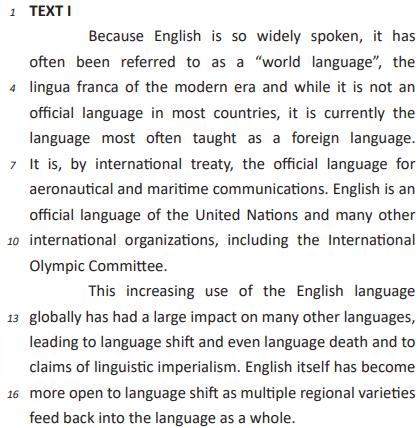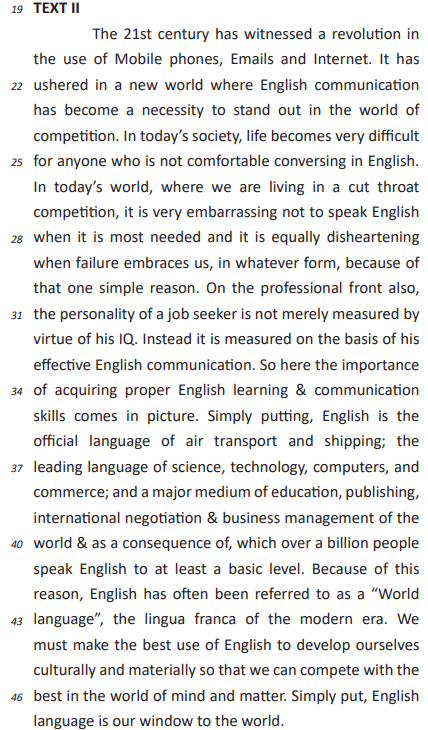Questões de Concurso
Sobre interpretação de texto | reading comprehension em inglês
Foram encontradas 9.421 questões
A “opção decolonial” implica nos
JUCÁ, Leina. Formação inicial de professores brasileiros de inglês: resistir, reexistir, coexistir. In: Érika Amâncio Caetano. (Org.). Pós-memória e decolonialidade no ensino de línguas no Brasil: as origens do status quo. 1ed. São Carlos - SP: Pedro e João Editores, 2021, v. 1, p. 110
Sobre o termo "agência" é INCORRETO afirmar que
Com base no exposto, avalie o que se afirma.
I - Kumaravadivelu (2016) discorre sobre as formas de desvalorização e inferioridade imputadas à carreira do professor de inglês mundo afora onde os espaços de ensino de língua inglesa se revelam (re)ocupados pelo assim chamado nativo ou falante nativo, apesar dos muitos esforços empreendidos para a ocupação desses espaços por meio da criação de políticas e programas locais de ensino e de formação de professores de língua inglesa.
II - Dentre os recursos usados para a manutenção da marginalização do professor não-nativo, Kumaravadivelu (2016) aponta, dentro do campo educacional, aspectos como: os planejamentos curriculares, a elaboração de materiais, os métodos de ensino, os testes padronizados e a formação docente, frisando, no entanto, os métodos e materiais produzidos em países do centro como os meios principais de administração e manutenção da marginalização e os principais responsáveis por impulsionar a estrutura de poder hegemônico.
III - O que fica evidente é uma recente valorização e um reconhecimento do professor não-nativo de língua inglesa, já que este exerce a profissão em seu próprio país, geograficamente distante daquele do falante nativo. Essa valorização do professor não-nativo se dá, segundo Kumaravadivelu, não de forma sutil e subliminar, mas de forma aberta e direta.
Está correto apenas o que se afirma em
Crazy Horse
Crazy Horse (Tasunke Witko, 1840-1877) was an Oglala Lakota Sioux warrior and warband leader considered among the greatest defenders of Sioux lands against the forces of the US government in the 19th century. He is one of the most famous Native American figures in history and among the Sioux's most honored heroes. Although he is often referred to as a "chief", Crazy Horse was actually a "Shirt Wearer" – a kind of "subchief" – who carried out the decisions of the council and also served as a war chief of a given band of warriors. Even so, Crazy Horse inspired such devotion in his followers that he was regarded as a "chief" and is referenced as such by others.
His name, Tasunke Witko (Crazy Horse), is accurately translated as "His Crazy Horse" or "His Horse is Crazy" and was his father's and grandfather's name, seemingly referencing a horse that behaved erratically. According to Black Elk, however, the name correlated to Crazy Horse's famous vision in which he saw his horse dancing as though "made only of shadow" in a strange or "crazy" way.
Crazy Horse dedicated himself to opposing the US military as early as 1854 following the Grattan Fight (Grattan Massacre) and the subsequent massacre of Little Thunder's camp in 1855 by Colonel William S. Harney. He continued his resistance over the next eleven years and was named a "Shirt Wearer" in 1865. He fought in the Battle of Plate River Bridge (1865), Red Cloud's War (1866-1868), the Battle of the Rosebud (1876), and the Battle of the Little Bighorn (1876). His last full-scale engagement with US forces was the Battle of Wolf Mountain in January 1877.
World History Encyclopedia. Adaptation.
( ) Crazy Horse is a famous Native American figure in history, especially for the Sioux. ( ) Tasunke Witko inspired many people and earned their devotion through his heroic deeds. ( ) He was named by Black Elk after he had a vision about Crazy Horse.
Crazy Horse
Crazy Horse (Tasunke Witko, 1840-1877) was an Oglala Lakota Sioux warrior and warband leader considered among the greatest defenders of Sioux lands against the forces of the US government in the 19th century. He is one of the most famous Native American figures in history and among the Sioux's most honored heroes. Although he is often referred to as a "chief", Crazy Horse was actually a "Shirt Wearer" – a kind of "subchief" – who carried out the decisions of the council and also served as a war chief of a given band of warriors. Even so, Crazy Horse inspired such devotion in his followers that he was regarded as a "chief" and is referenced as such by others.
His name, Tasunke Witko (Crazy Horse), is accurately translated as "His Crazy Horse" or "His Horse is Crazy" and was his father's and grandfather's name, seemingly referencing a horse that behaved erratically. According to Black Elk, however, the name correlated to Crazy Horse's famous vision in which he saw his horse dancing as though "made only of shadow" in a strange or "crazy" way.
Crazy Horse dedicated himself to opposing the US military as early as 1854 following the Grattan Fight (Grattan Massacre) and the subsequent massacre of Little Thunder's camp in 1855 by Colonel William S. Harney. He continued his resistance over the next eleven years and was named a "Shirt Wearer" in 1865. He fought in the Battle of Plate River Bridge (1865), Red Cloud's War (1866-1868), the Battle of the Rosebud (1876), and the Battle of the Little Bighorn (1876). His last full-scale engagement with US forces was the Battle of Wolf Mountain in January 1877.
World History Encyclopedia. Adaptation.








In text II, the verbs “has witnessed” (line 20), “has become” (line 23) and “has ushered” (lines 21 and 22) are in the present perfect tense, as well as the sentence “Because of this reason, English has often been referred to as a ‘World language’, the lingua franca of the modern era.” (lines from 41 to 43).


Both texts say that English is the official language for most countries in the world, in addition for being the official language of the United Nations and the European Union. English is also the official language of aeronautical and maritime communications, air transport and shipping; science, technology, computers and e‑commerce.


The use of English language has increased in large scale and caused many other languages to be extinguished. Due to its linguistic imperialism, English does not accept any changes in the language.


In the texts, the author criticizes the reasons why English has become an international language and explores the fact that there are other languages that could be the lingua franca.


English communication influences a person’s professional life as much as the intelligence quotient does.


According to the author, English is a necessity and it is very embarrassing not knowing how to speak it.
TEXT I
Is English language teaching for you? A guide to a new career
Marie Therese Swabey
June 14, 2021
Whether you’re just starting out or thinking of a career change, teaching English as a foreign language is one of the most rewarding professional journeys you can embark on.
In English language teaching, there is a lot of career potential. As you develop your skills and take on more responsibilities, you can enjoy a long-term career. Many professionals become senior teachers or teacher trainers, or move into management or materials writing.
Why become an English language teacher?
There are lots of reasons you might want to become an English language teacher. For a start, you can make a real difference in people’s lives. According to a 2019 survey by Wall Street English, 18% of professionals who have learned English report that they feel happier at work; 12% say they feel happier in general; and half of English speakers earn 25% more because of their language skills.
Moreover, English language teaching is an immensely flexible profession. You can decide whether to take a public or private job, or offer lessons on your own. Your working conditions are flexible too. You might prefer to work in a local school or academy, but many English language teaching jobs also allow you to work online from home. And if you’re feeling adventurous, there are lots of opportunities to live and work abroad, in a new country and culture. If you do travel further afield, you might even learn a new language of your own.
English language teaching is a career that encourages creativity. You’ll become an expert at designing lessons and making learning materials to meet the needs of your students. Best of all ... it’s fun! You spend your day with interesting, engaging people who are keen to learn. What could be better than that?
What do English language teachers do every day?
It probably goes without saying that language educators teach students English on a day-to-day basis. But there are plenty of other aspects to the job as well.
English language teachers assess their learners through quick tests and official exams. They use this information to define learning objectives, and then plan courses and classes that meet their students’ needs.
Language teachers use a range of coursebooks and English language teaching materials, including a variety of audio, visual and digital tools. At the same time, they find and create teaching and learning materials of their own.
In the process of developing learners’ reading, listening, speaking andwriting abilities, teachers also help students develop confidence in presenting and communicating ideas. Furthermore, language teachers encourage students to develop important 21st century skills, such as creativity, collaboration, leadership, autonomous learning and adaptability. These skills are transferable and will help learners in many areas throughout their lives.
What do you need to become an English language teacher?
Being a good English teacher requires more than just being able to speak the language fluently. You’ll also need a comprehensive knowledge of English grammar, pronunciation and vocabulary, combined with excellent communication skills. Teachers of young learners will also need to have an understanding of how to teach engaging, effective classes to children.
It helps if you are comfortable speaking in front of other people, managing groups of learners, and able to plan and organise your time. And it’s important to have a friendly, sympathetic nature and a good degree of cultural sensitivity. After all, you’ll be working with people from all over the world and all walks of life.
Where can you teach?
There are opportunities to teach the English language almost everywhere. For example, you can teach English in an Englishspeaking country such as the UK, the US, Canada, Australia, New Zealand or Ireland. You’ll find many private and public programmes and classes for people who have come to work or study, and who need to improve their English.
Alternatively, you can teach English in schools and universities in countries where English is the official language – but not always how people communicate on a daily basis. Nigeria, Malta, India and Sierra Leone are examples. You might also prefer to teach in non-English-speaking countries, where you’ll have the opportunity to immerse yourself in the local culture and learn a new language too.
In terms of teaching environments, there are opportunities to teach in private academies, public schools, universities, offices, private homes and online.
Who do you teach?
There is an extensive list of people who want to learn to speak English. Many teachers start out with a variety of class types to find out which they like best. Your options include (but are not limited to):
- adults in private groups or one-to-one classes
- adults in language schools, colleges or universities
- professionals such as business people, medical professionals, pilots, etc. who require English for a specific purpose
- students who are preparing for an official exam
- people who have moved to an English-speaking country and need to improve their English
- young learners in one-to-one classes or groups, or online
- young learners in private language schools, or in secondary/ primary schools.
Adapted from: https://www.cambridgeenglish.org/blog/is-english-language-teachingfor-you. Accessed on May 2, 2024
TEXT II

TEXT I
Is English language teaching for you? A guide to a new career
Marie Therese Swabey
June 14, 2021
Whether you’re just starting out or thinking of a career change, teaching English as a foreign language is one of the most rewarding professional journeys you can embark on.
In English language teaching, there is a lot of career potential. As you develop your skills and take on more responsibilities, you can enjoy a long-term career. Many professionals become senior teachers or teacher trainers, or move into management or materials writing.
Why become an English language teacher?
There are lots of reasons you might want to become an English language teacher. For a start, you can make a real difference in people’s lives. According to a 2019 survey by Wall Street English, 18% of professionals who have learned English report that they feel happier at work; 12% say they feel happier in general; and half of English speakers earn 25% more because of their language skills.
Moreover, English language teaching is an immensely flexible profession. You can decide whether to take a public or private job, or offer lessons on your own. Your working conditions are flexible too. You might prefer to work in a local school or academy, but many English language teaching jobs also allow you to work online from home. And if you’re feeling adventurous, there are lots of opportunities to live and work abroad, in a new country and culture. If you do travel further afield, you might even learn a new language of your own.
English language teaching is a career that encourages creativity. You’ll become an expert at designing lessons and making learning materials to meet the needs of your students. Best of all ... it’s fun! You spend your day with interesting, engaging people who are keen to learn. What could be better than that?
What do English language teachers do every day?
It probably goes without saying that language educators teach students English on a day-to-day basis. But there are plenty of other aspects to the job as well.
English language teachers assess their learners through quick tests and official exams. They use this information to define learning objectives, and then plan courses and classes that meet their students’ needs.
Language teachers use a range of coursebooks and English language teaching materials, including a variety of audio, visual and digital tools. At the same time, they find and create teaching and learning materials of their own.
In the process of developing learners’ reading, listening, speaking andwriting abilities, teachers also help students develop confidence in presenting and communicating ideas. Furthermore, language teachers encourage students to develop important 21st century skills, such as creativity, collaboration, leadership, autonomous learning and adaptability. These skills are transferable and will help learners in many areas throughout their lives.
What do you need to become an English language teacher?
Being a good English teacher requires more than just being able to speak the language fluently. You’ll also need a comprehensive knowledge of English grammar, pronunciation and vocabulary, combined with excellent communication skills. Teachers of young learners will also need to have an understanding of how to teach engaging, effective classes to children.
It helps if you are comfortable speaking in front of other people, managing groups of learners, and able to plan and organise your time. And it’s important to have a friendly, sympathetic nature and a good degree of cultural sensitivity. After all, you’ll be working with people from all over the world and all walks of life.
Where can you teach?
There are opportunities to teach the English language almost everywhere. For example, you can teach English in an Englishspeaking country such as the UK, the US, Canada, Australia, New Zealand or Ireland. You’ll find many private and public programmes and classes for people who have come to work or study, and who need to improve their English.
Alternatively, you can teach English in schools and universities in countries where English is the official language – but not always how people communicate on a daily basis. Nigeria, Malta, India and Sierra Leone are examples. You might also prefer to teach in non-English-speaking countries, where you’ll have the opportunity to immerse yourself in the local culture and learn a new language too.
In terms of teaching environments, there are opportunities to teach in private academies, public schools, universities, offices, private homes and online.
Who do you teach?
There is an extensive list of people who want to learn to speak English. Many teachers start out with a variety of class types to find out which they like best. Your options include (but are not limited to):
- • adults in private groups or one-to-one classes
- • adults in language schools, colleges or universities
- • professionals such as business people, medical professionals, pilots, etc. who require English for a specific purpose
- • students who are preparing for an official exam
- • people who have moved to an English-speaking country and need to improve their English
- • young learners in one-to-one classes or groups, or online
- • young learners in private language schools, or in secondary/ primary schools.
Adapted from: https://www.cambridgeenglish.org/blog/is-english-language-teachingfor-you. Accessed on May 2, 2024